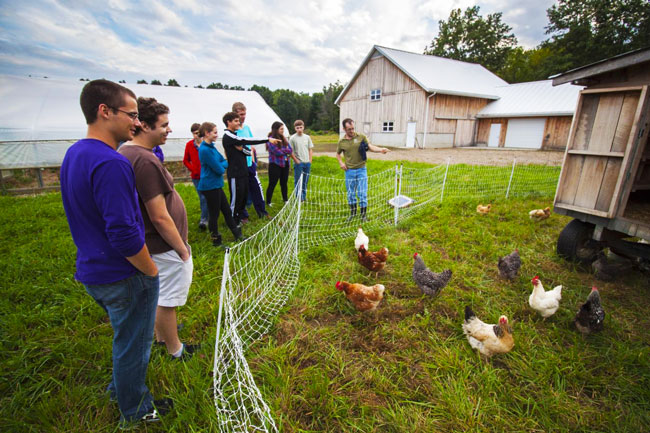Growing up in south-central Indiana, Jon Zirkle didn’t have many ideas as to what he wanted to do as a career. He found himself in a position many young people find themselves in: a creative, artistic person, with a love for the outdoors, open to the possibilities.
Zirkle is an educator and farm manager at Merry Lea Sustainable Farm, part of an environmental center owned by Goshen College. The farm is located in Albion, a 30-minute drive southeast from Goshen.“I didn’t know what I wanted after I left high school, but I know I was passionate about the environment and I loved being outside,” he said.
Zirkle decided to pursue this appreciation for outdoors, choosing to study geography at Calvin College with a minor in environmental studies. He then took several classes at Au Sable Institute of Environmental Studies, where he began learning about sustainable agriculture. He moved across the country to pursue a master’s degree at the University of Vermont.
“I loved the practical work that came with my master’s work, especially the field research,” he said. “Vermont also has an amazing local food scene.”
Coming across an opening at Merry Lea, Zirkle moved to the back to the Midwest. Here, his responsibilities include making seasonal and long-term plans for the farm, supervising farm workers and managing the Merry Lea’s community-supported agriculture (CSA) and its presence at local food markets.
CSAs are networks of people who pay a local farmer to provide them with grown and raised crops and livestock. These types of programs encourage community food sharing and lessen dependence on imported foods. This ensures fresher foods, less transportation of food products, healthier foods and less waste.
As of now, Merry Lea has 26 different shares in their CSA. They offer all kinds of foods, including some that people may not think grows well this far north. Included in their weekly paper bag deliveries are carrots, potatoes, okra, tomatoes, wild greens and sorghum.
“We also include a little newsletter in the deliveries to let people know what’s going on at the farm as well as what food they’ve gotten this week,” said Zirkle.
Zirkle says that as well as some formal education responsibilities at Merry Lea, he also likes to engage the community with small things like these educational letters.
“Sometimes people aren’t familiar with what they’re getting, especially with some of the more obscure greens we grow,” he said.
Zirkle feels strongly about food, especially as a tool. For this reason, he engages people with food in the most deliberate ways possible and in any way he can. Zirkle is a leader of the Elkhart Food Council, which seeks to address issues such as food scarcity and education in Elkhart County.
Zirkle also teaches a few classes as part of the Agroecology Summer Intensive for students during the summer, such as soil biology and plant identification classes.
“It’s not easy work,” he said. “It’s not like a nine-to-five where you can come home and forget about work for the weekend. Usually Fridays are our busiest days, scrambling to get everything organized to take to the Goshen Farmer’s Market by Saturday morning. But it’s rewarding. I think that’s why I’m passionate about it.”
For Zirkle, the side effects, such as educating people and providing local food options, are the true fruits of his labor.
“We live in a time where development is happening everywhere; [there are] huge industrial farms and lots of transportation,” he said. “Systems that rely on immediate resources with sustainable and healthy jobs are what we need today.”
He also believes that sustainable farms are valuable for both the Earth and the people that they are connected to. He says that he has experienced both “healing and renewal” from working hands-on with the Earth, and strives for others to experience that renewal.
“It’s integrally a part of spiritual life for me: being outdoors, being connected. It brings together a lot of aspects of life,” said Zirkle.
Collecting the food and selling it are both highlights.
“I’ve connected with some of the most unimaginable people at food markets,” Zirkle said. “You’re selling okra one week at the market and you’ll end up going home with a new okra recipe that someone’s grandma created.”
He recalls a recent experience he shared with a Mexican customer at the Goshen Farmer’s Market on a Saturday morning. This particular customer was attracted to the Merry Lea stand because of the tomatillos, a small green nightshade plant that is also known as the Mexican husk tomato. This customer couldn’t be more excited to see the fruit, which is key to many Latino dishes.
“My goal now is to set clearer paths for young people, or anyone really, to actively participate in their local food movement,” Zirkle said. “There’s a democracy of food that I hope we can bring to the forefront of discussion. We all have our part. Food is a social justice issue. It’s a tool. There are many opportunities for people to make change in their area of expertise, whether it be policy, working the land or engaging the community. It’s an open field.”



